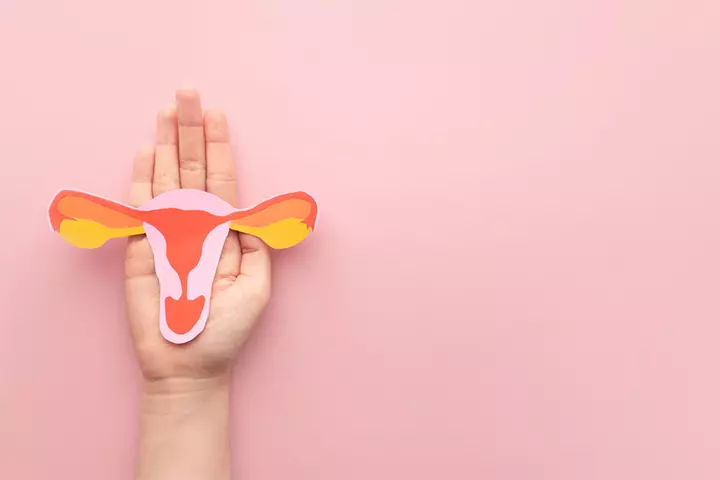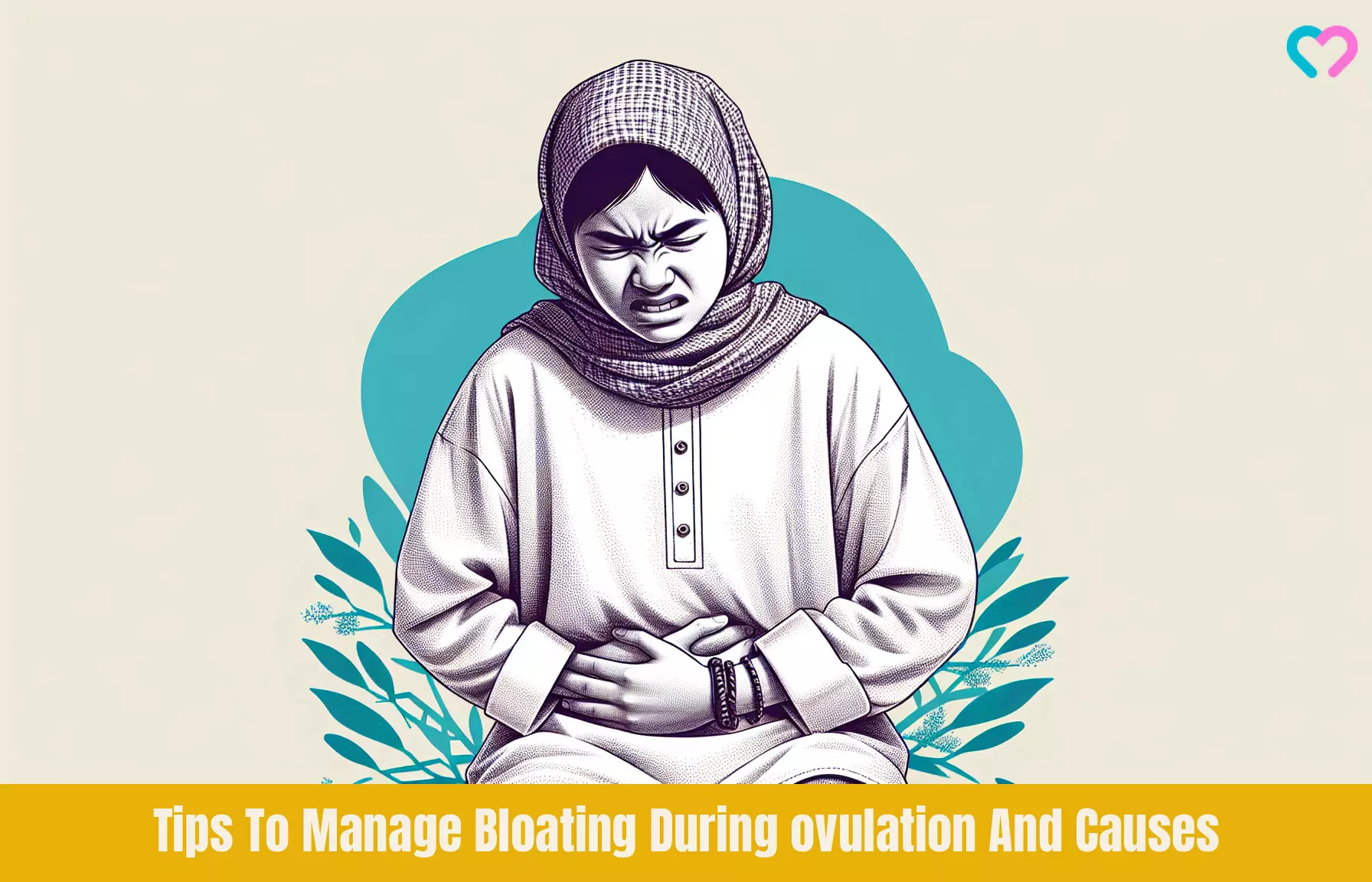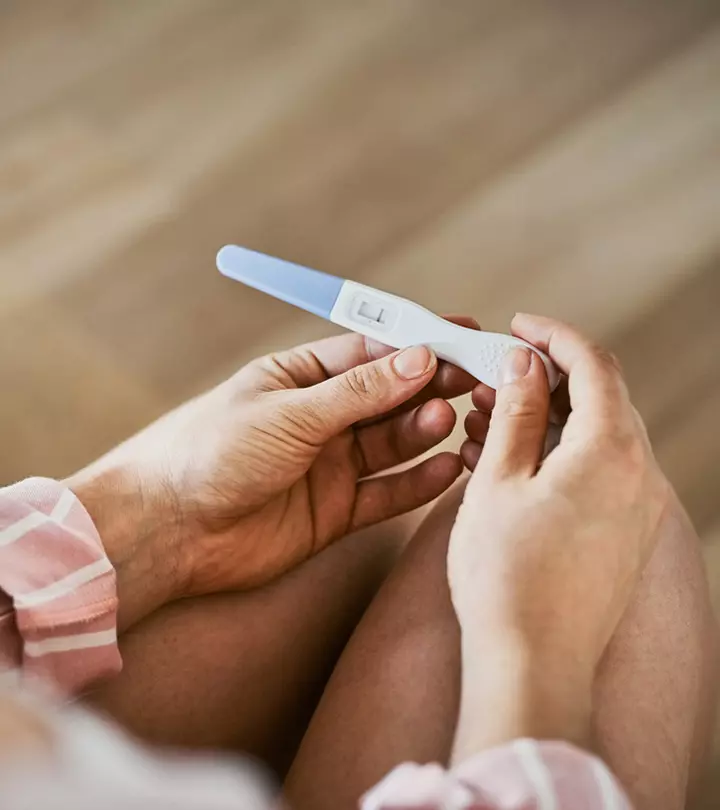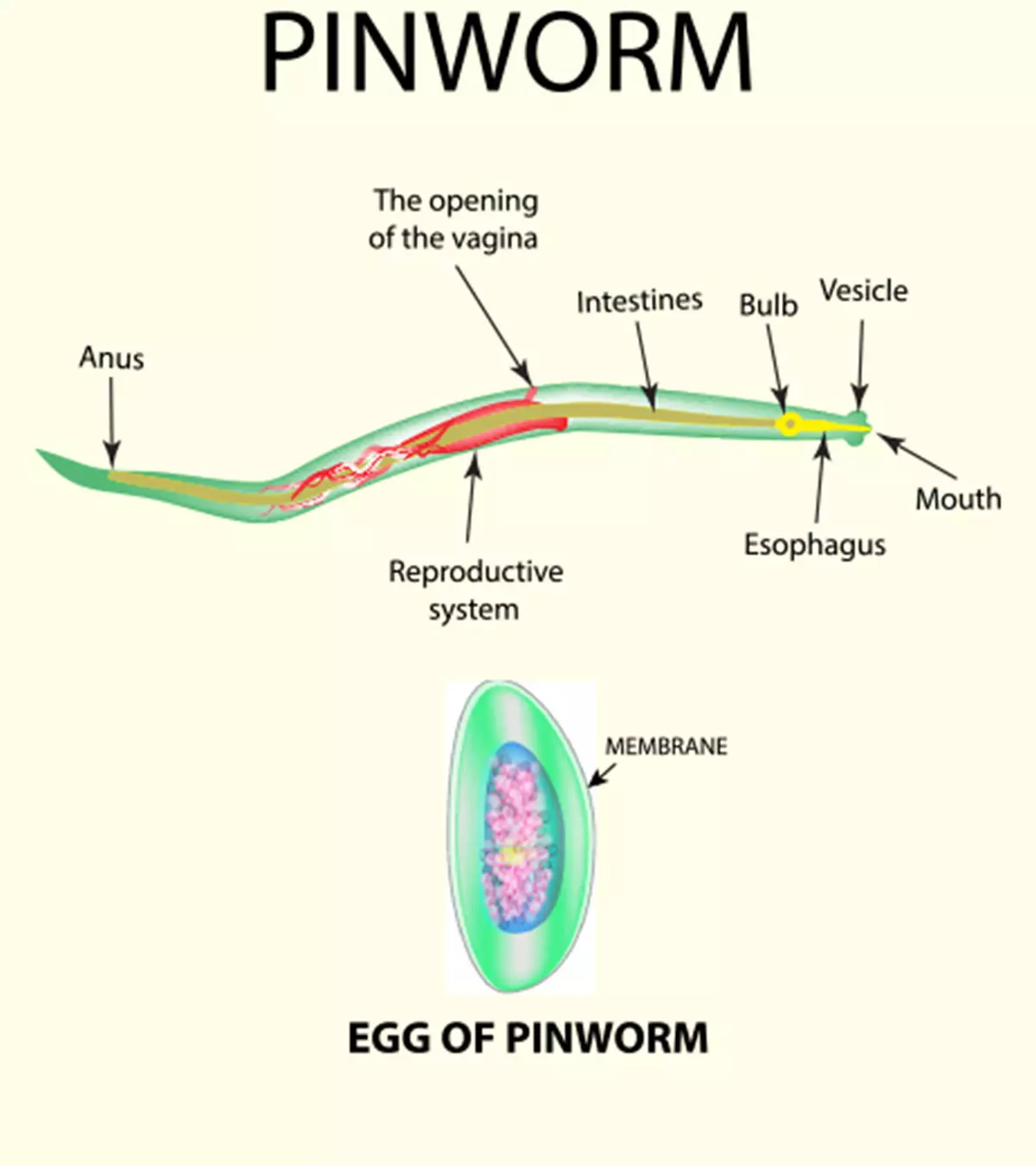
Image: Shutterstock
Bloating during ovulation is a common yet often overlooked issue many women experience. This uncomfortable sensation of fullness and tightness in the abdomen can be frustrating, especially when it disrupts daily activities (1) (2). While ovulation is a key factor, there are several other reasons for bloating, including constipation (3). Understanding the underlying causes of ovulation-related bloating and learning effective management strategies can help alleviate discomfort. In this article, we’ll explore the factors contributing to bloating during ovulation and offer practical tips to reduce its impact, allowing you to feel more comfortable and in control during this natural phase of your menstrual cycle.

Key Pointers
- Abdominal bloating or gassiness is one of the secondary symptoms of ovulation.
- Hormonal fluctuations, especially the excess estrogen, may cause increased water retention, resulting in bloating during ovulation.
- Including low-FODMAP foods, adequate hydration, and avoiding junk food are some ways of managing the condition.
Is Bloating A Sign Of Ovulation?

According to the American Pregnancy Association (APA), abdominal bloating is among the prevalent secondary signs of ovulation (1) (4).
During the ovulatory phase, you may experience mild unilateral abdominal pain or cramps, commonly known as Mittelschmerz (“middle pain” or “pain in the middle of the month”), which may occur in either side of the pelvic region and last for a few hours to a few days.
If bloating is accompanied by other symptoms, you could be ovulating. However, these ovulation symptoms vary among women (5). You may also experience bloating after ovulation due to premenstrual syndrome (PMS), which occurs a week or two before the menses (6). According to the Cleveland Clinic, “As many as 3 in 4 women say they experience abdominal bloating before and during their menstrual periods (7).”
 Did you know?
Did you know?What Causes Severe Bloating During Ovulation?

Generally, bloating during ovulation is not harmful. Common symptoms of bloating during ovulation include a feeling of fullness, discomfort in the abdominal area, and changes in bowel movements. Some women may also experience changes in appetite or cravings, which can accompany the hormonal fluctuations during this time. However, severe bloating, when accompanied by other symptoms, such as abdominal menstrual cramps, nausea, or vomiting, can be a symptom of underlying conditions such as (8) (9).
- Endometriosis
- Polycystic ovary syndrome (PCOS)
- Ovarian cysts
- Irritable bowel syndrome (IBS)
If you experience persistent bloating during ovulation, consult a gynecologist to identify any underlying condition and get proper treatment.
Which Hormone Causes Bloating During Ovulation?
In a typical menstrual cycle, the mid-cycle estradiol (estrogen) levels are the highest right before ovulation, initiating positive feedback on the luteinizing hormone (LH) and resulting in an LH surge that allows ovulation. Additionally, following ovulation, progesterone levels rise (2) (10).
These hormonal imbalances, specifically the excess of estrogen (also known as estrogen dominance), may trigger an increase in water retention, leading to bloating during ovulation (1). A study suggests that adolescent girls are more prone to the effects of hormonal imbalances (11).
 Quick fact
Quick factShould You Worry About Bloating During Ovulation?
Although it can be quite uncomfortable, ovulation bloating is not a life-threatening condition. Most women may not notice ovulation bloating, while a few experience issues such as slow bowel movement, constipation, increased gas production, and abdominal discomfort (5).
Is Bloating Associated To Weight Gain During Ovulation?
Ovulation and weight gain are not directly associated. However, bloating induced by high estradiol levels during ovulation may make you appear heavier before your menstrual bleeding, known as premenstrual weight gain (2). Additionally, increased progesterone levels during ovulation also induce fatigue and heaviness (5).
During the ovulatory phase, you may also notice cravings for salty foods, such as chips, cheese, and processed foods. This increased salt intake during ovulation may induce fluid retention (bloating) in your body, giving the impression of weight gain (1).
How To Manage Bloating During Ovulation?
During ovulation, you can manage bloating and prevent its recurrence with the following remedial measures (5) (12) (13):
- Consume low-FODMAP diet
Follow a low-FODMAP (fermentable oligosaccharides, disaccharides, monosaccharides, and polyols) diet, as high-FODMAP foods contain indigestible carbohydrates that can cause increased water retention in the tissues. A low-FODMAP diet is low in fermentable carbohydrates, reducing the likelihood of bloating, gas, and discomfort (14). - Avoid junk foods
Avoid processed foods as they are often high in sodium, unhealthy fats, and refined sugars, which can contribute to fluid retention and inflammation (15).

- Stay hydrated and include dietary fiber
Drink plenty of water and include dietary fiber in your diet (1). Fiber helps regulate bowel movements, prevent constipation, and support overall gut function. Some good sources of dietary fiber include quinoa, oats, pears, apples, almonds, and brown rice (16). - Avoid carbonated beverages
Carbonated drinks, such as soda, can exacerbate bloating because they can cause extra gas to build up in the stomach (17). Limiting or avoiding these drinks may help manage some discomfort associated with bloating or flatulence. - Consider diuretics
You may use diureticsiA medication that increases urine production in the kidneys in reasonable doses to minimize water retention. However, take them only in prescribed doses under medical guidance as they can have side effects, including electrolyte imbalance, dehydration, and blood pressure changes. - Indulge in regular exercise
Stress can exacerbate bloating symptoms. Regular exercise can help alleviate stress. It can also aid in releasing trapped gas after meals, promoting better digestion and reducing discomfort (2) (18). Incorporating relaxation techniques such as meditation or yoga can also help manage bloating. - Include probiotics
Add probiotics, such as yogurt, miso, and kefir, to your daily diet. You can also consume herbs, such as peppermint and turmeric, to maintain a healthy gut microbiome and reduce bloating (7). - Eat magnesium and potassium-rich foods
Include magnesium and potassium-rich foods, such as bananas and nuts, in your diet (19). Magnesium has a laxative effect which helps to reduce bloating. On the other hand, Potassium aids in reducing bloating by helping balance sodium levels in the body (7). - Track your menstrual cycle
Track your menstrual cycle through an ovulation calculator to understand your ovulation period (4). It can help you know when bloating may occur, as hormonal changes during ovulation and menstruation can cause water retention. Recording symptoms like bloating allows you to identify and manage patterns more effectively. You can even start a menstrual binnacle to keep track of all the characteristics that are present in your period.

- Consider over-the-counter (OTC) medications
You may take over-the-counter (OTC) medications like simethicone or charcoal capsules. Sometimes, birth control pills (BCPs) can also help relieve menstrual bloating during ovulation by inhibiting hormonal changes (20). However, use these medicines only after consulting with your doctor.
Note: Bulk laxatives or bowel stimulants may be prescribed in extreme cases of ovulation bloating in operational settings. Bulk laxatives can help absorb water into the stool, making it easier to pass and reducing bloating. On the other hand, bowel stimulants can cause intestinal muscles to move stool more efficiently, helping to relieve bloating caused by slow bowel movements (21).
 Quick tip
Quick tipHow Is Ovulation Bloating Different From Pregnancy Bloating?

Typically, the symptoms of ovulation, including bloating, sore breasts, mood swings, cramping, and unilateral pelvic pain, are similar to those that appear in the early weeks of pregnancy. This may lead to confusion regarding whether you are ovulating or pregnant.
Therefore, it is important to prioritize reproductive health and be cautious during your ovulatory phase if you had unprotected sex and have other pregnancy symptoms, such as nausea or vomiting. Take a pregnancy test if there is any delay in your menstrual period. You can also use fertility tracking apps to help you track the ovulation dates if you want to conceive. Such apps can also be used to track menstrual cycles and provide information about menstrual discomfort or menstrual irregularities (3).
Frequently Asked Questions
1. How does bloating during ovulation affect a woman’s daily life and activities?
Bloating during ovulation may not be a cause of concern in many women. But bloating and other associated symptoms may be unpleasant for others. The severity of pelvic and abdominal pain can vary from woman to woman and inadvertently disrupt daily functions. Bloating may cause a feeling of fullness and an increase in body weight, which can be mentally stressful for some women (1).
2. Why does bloating occur during ovulation, and not at any other time during the menstrual cycle?
Bloating can occur before or after ovulation and some women may experience bloating during their periods due to factors, such as dietary choices, hormonal changes, and stress. The varying levels of estrogen cause bloating. Estrogen levels rise during the first half of the menstrual cycle and decrease once the egg is released, leading to the excretion of excess water from the body (10).
3. Are there any long-term consequences of experiencing bloating during ovulation?
Bloating during ovulation is usually very brief. However, if the symptoms are chronic or severe, it is best to visit a healthcare professional for an examination and proper treatment (1).
4. How much bloating is normal during ovulation?
Bloating during ovulation is common and usually goes away after the phase is over. This is one of the many ovulation symptoms that women might experience. So if you experience fullness around the time of your periods, know that it is a common symptom that arises from hormonal fluctuations. You may try different remedies and make the necessary changes in your diet if the bloating is not too uncomfortable. However, if it is accompanied by other symptoms such as nausea and vomiting, you may consult your doctor to understand the cause as it may require medical intervention.
Infographic: Management Of Bloating During Ovulation
While bloating during ovulation is typically normal, it may cause discomfort and hinder your day-to-day activities. It may range from mild to severe bloating; therefore, knowing to manage the condition effectively could be a boon. Take a look at this infographic below to learn about various management tips for bloating during ovulation.
Some thing wrong with infographic shortcode. please verify shortcode syntax
Illustration: Tips To Manage Bloating During ovulation And Causes

Image: Stable Diffusion/MomJunction Design Team
Have you wondered why you feel bloated during ovulation and worried about whether it is normal? The following animated video explains why this happens and how to reduce bloating efficiently.
References
- Ovulation Symptoms: Bloating.
https://nordicalagos.org/ovulation-symptoms-bloating/ - Colin P. White et al.; (2011); Fluid Retention over the Menstrual Cycle: 1-Year Data from the Prospective Ovulation Cohort.
https://www.ncbi.nlm.nih.gov/pmc/articles/PMC3154522/ - Am I Pregnant Or…?
https://americanpregnancy.org/pregnancy-symptoms/am-i-pregnant-or/ - Ovulation Symptoms.
https://americanpregnancy.org/getting-pregnant/infertility/signs-of-ovulation/ - Problems with Menstrual Flows.
https://oacapps.med.jhmi.edu/OBGYN-101/Text/Menstrual%20Problems/Menses.htm - Premenstrual syndrome (PMS).
https://womenshealth.gov/menstrual-cycle/premenstrual-syndrome - Bloated Stomach.
https://my.clevelandclinic.org/health/symptoms/21740-bloated-stomach - Ha Ryun Won and Jason Abbott; (2010); Optimal management of chronic cyclical pelvic pain: an evidence-based and pragmatic approach.
https://www.ncbi.nlm.nih.gov/pmc/articles/PMC2990894/ - Ovarian cysts.
https://www.womenshealth.gov/a-z-topics/ovarian-cysts - Julie E. Holesh et al.; (2025); Physiology Ovulation.
https://www.ncbi.nlm.nih.gov/books/NBK441996/ - Abuaku, Benjamin, et al.; (2025); Knowledge, Perceptions, and Management of Symptoms of Hormonal Imbalance among Adolescent Girls in Selected Schools in Ghana: A Qualitative Exploratory Study.
https://www.frontiersin.org/journals/reproductive-health/articles/10.3389/frph.2025.1502352/full - Anna Foley et al.; (2014); Management Strategies for Abdominal Bloating and Distension.
https://www.ncbi.nlm.nih.gov/pmc/articles/PMC4991532/ - Bloating.
https://familydoctor.org/condition/bloating/ - Low FODMAP Diet.
https://my.clevelandclinic.org/health/treatments/22466-low-fodmap-diet - Junk food is engineered to taste good, not satisfy.
https://www.uclahealth.org/news/article/junk-food-is-engineered-to-taste-good-not-satisfy - Dietary fibre.
https://www.betterhealth.vic.gov.au/health/healthyliving/fibre-in-food - Belching, Bloating, and Flatulence Overview.
https://gi.org/topics/belching-bloating-and-flatulence/ - Diuretics.
https://my.clevelandclinic.org/health/treatments/21826-diuretics - S. Alagendran et al.; (2010); Evaluation of Salivary Electrolytes during Normal Menstrual Cycle with Special Reference to Ovulation.
http://www.thescipub.com/abstract/10.3844/ajassp.2010.1066.1072 - Simethicone Capsules or Tablets.
https://my.clevelandclinic.org/health/drugs/19547-simethicone-capsules-or-tablets - Laxatives.
https://my.clevelandclinic.org/health/treatments/25121-laxatives - Menstrual disorders.
https://familydoctor.org/condition/bloating/
Community Experiences
Join the conversation and become a part of our nurturing community! Share your stories, experiences, and insights to connect with fellow parents.
Read full bio of Dr. Miguel Angel Razo Osorio
Read full bio of Reshmi Das
Read full bio of Rebecca Malachi
Read full bio of Aneesha Amonz

















